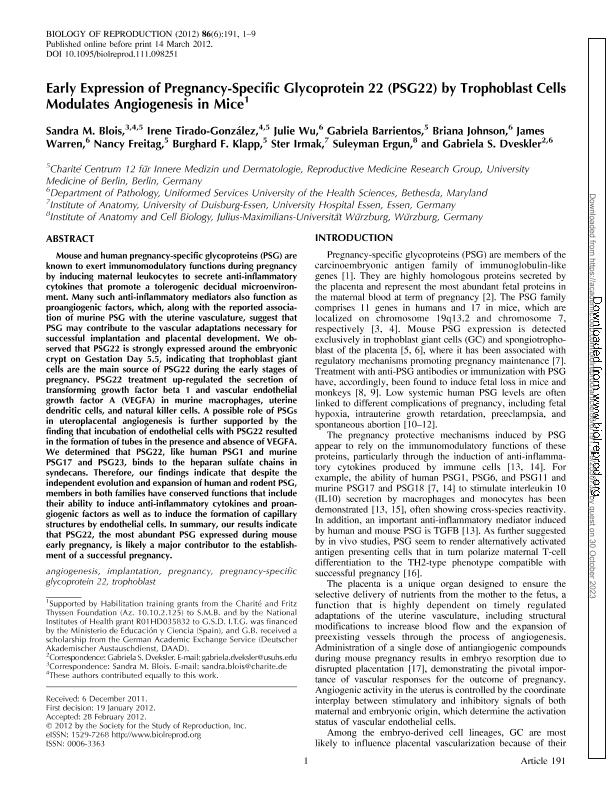Mostrar el registro sencillo del ítem
dc.contributor.author
Blois, Sandra M.

dc.contributor.author
Tirado González, Irene

dc.contributor.author
Wu, Julie
dc.contributor.author
Barrientos, Gabriela Laura

dc.contributor.author
Johnson, Briana
dc.contributor.author
Warren, James
dc.contributor.author
Freitag, Nancy

dc.contributor.author
Klapp, Burghard F.

dc.contributor.author
Irmak, Ster
dc.contributor.author
Ergun, Suleyman
dc.contributor.author
Dveskler, Gabriela S.
dc.date.available
2023-10-30T18:17:35Z
dc.date.issued
2012-06
dc.identifier.citation
Blois, Sandra M.; Tirado González, Irene; Wu, Julie; Barrientos, Gabriela Laura; Johnson, Briana; et al.; Early expression of pregnancy-specific glycoprotein 22 (PSG22) by trophoblast cells modulates angiogenesis in mice.; Society for the Study of Reproduction; Biology Of Reproduction (online); 86; 6; 6-2012; 1-9
dc.identifier.issn
0006-3363
dc.identifier.uri
http://hdl.handle.net/11336/216458
dc.description.abstract
Mouse and human pregnancy-specific glycoproteins (PSG) are known to exert immunomodulatory functions during pregnancy by inducing maternal leukocytes to secrete anti-inflammatory cytokines that promote a tolerogenic decidual microenvironment. Many such anti-inflammatory mediators also function as proangiogenic factors, which, along with the reported association of murine PSG with the uterine vasculature, suggest that PSG may contribute to the vascular adaptations necessary for successful implantation and placental development. We observed that PSG22 is strongly expressed around the embryonic crypt on Gestation Day 5.5, indicating that trophoblast giant cells are the main source of PSG22 during the early stages of pregnancy. PSG22 treatment up-regulated the secretion of transforming growth factor beta 1 and vascular endothelial growth factor A (VEGFA) in murine macrophages, uterine dendritic cells, and natural killer cells. A possible role of PSGs in uteroplacental angiogenesis is further supported by the finding that incubation of endothelial cells with PSG22 resulted in the formation of tubes in the presence and absence of VEGFA. We determined that PSG22, like human PSG1 and murine PSG17 and PSG23, binds to the heparan sulfate chains in syndecans. Therefore, our findings indicate that despite the independent evolution and expansion of human and rodent PSG, members in both families have conserved functions that include their ability to induce anti-inflammatory cytokines and proangiogenic factors as well as to induce the formation of capillary structures by endothelial cells. In summary, our results indicate that PSG22, the most abundant PSG expressed during mouse early pregnancy, is likely a major contributor to the establishment of a successful pregnancy.
dc.format
application/pdf
dc.language.iso
eng
dc.publisher
Society for the Study of Reproduction

dc.rights
info:eu-repo/semantics/openAccess
dc.rights.uri
https://creativecommons.org/licenses/by-nc-sa/2.5/ar/
dc.subject
implantation
dc.subject
pregnancy
dc.subject
trophoblast
dc.subject
angiogenesis
dc.subject
pregnancy specific glycoprotein 22
dc.subject.classification
Biología Reproductiva

dc.subject.classification
Ciencias Biológicas

dc.subject.classification
CIENCIAS NATURALES Y EXACTAS

dc.subject.classification
Inmunología

dc.subject.classification
Medicina Básica

dc.subject.classification
CIENCIAS MÉDICAS Y DE LA SALUD

dc.title
Early expression of pregnancy-specific glycoprotein 22 (PSG22) by trophoblast cells modulates angiogenesis in mice.
dc.type
info:eu-repo/semantics/article
dc.type
info:ar-repo/semantics/artículo
dc.type
info:eu-repo/semantics/publishedVersion
dc.date.updated
2023-04-20T16:52:14Z
dc.journal.volume
86
dc.journal.number
6
dc.journal.pagination
1-9
dc.journal.pais
Estados Unidos

dc.journal.ciudad
Madison
dc.description.fil
Fil: Blois, Sandra M.. University Medicine of Berlin; Alemania
dc.description.fil
Fil: Tirado González, Irene. University Medicine of Berlin; Alemania
dc.description.fil
Fil: Wu, Julie. Uniformed Services University of the Health Sciences; Estados Unidos
dc.description.fil
Fil: Barrientos, Gabriela Laura. University Medicine of Berlin; Alemania. Consejo Nacional de Investigaciones Científicas y Técnicas; Argentina
dc.description.fil
Fil: Johnson, Briana. Uniformed Services University of the Health Sciences; Estados Unidos
dc.description.fil
Fil: Warren, James. Uniformed Services University of the Health Sciences; Estados Unidos
dc.description.fil
Fil: Freitag, Nancy. University Medicine of Berlin; Alemania
dc.description.fil
Fil: Klapp, Burghard F.. University Medicine of Berlin; Alemania
dc.description.fil
Fil: Irmak, Ster. University of Duisburg Essen; Alemania
dc.description.fil
Fil: Ergun, Suleyman. Julius Maximilians Universitat Wurzburg. Biozentrum; Alemania
dc.description.fil
Fil: Dveskler, Gabriela S.. Uniformed Services University of the Health Sciences; Estados Unidos
dc.journal.title
Biology Of Reproduction (online)

dc.relation.alternativeid
info:eu-repo/semantics/altIdentifier/doi/http://dx.doi.org/10.1095/biolreprod.111.098251
dc.relation.alternativeid
info:eu-repo/semantics/altIdentifier/url/https://www.ncbi.nlm.nih.gov/pmc/articles/PMC3386151/
dc.relation.alternativeid
info:eu-repo/semantics/altIdentifier/url/https://academic.oup.com/biolreprod/article/86/6/191,%201-9/2530732
Archivos asociados
